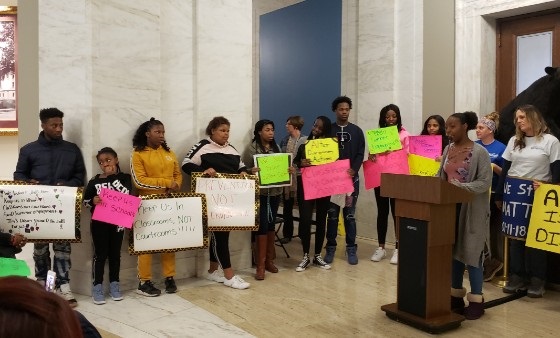
West Virginians advocate at the state Legislature to help formerly incarcerated people get access to food assistance, employment, and other critical services. Lida Shepherd / AFSC
West Virginia, like many other states, has experienced a dramatic increase in the prison population over the last few decades. And once people finish serving their sentence, they continue to face punishment for their criminal conviction –confronting many barriers while transitioning to life outside of the prison walls.
For tens of thousands of West Virginians and many more people across the United States, a criminal conviction severely limits their access to food, housing, education, employment, travel, and recreation. And that impacts the lives of their children and families, as well.
The good news: West Virginia has taken major steps to end these unfair, discriminatory policies. This year, the state legislature made sweeping changes to eliminate many of these barriers, which will help make possible a healthier future for formerly incarcerated people and their families.
These victories are thanks to bipartisan legislative champions and, most of all, to the organizing and advocacy by people impacted by these policies – an effort that AFSC’s West Virginia Economic Justice Project is proud to support.
Here’s a look at how these changes will improve life for people in West Virginia:
Ensuring food security
Tens of thousands of people with drug felony convictions will no longer be denied SNAP (Supplemental Nutrition Assistance Program, formerly food stamp) benefits, under House Bill 2459, which was signed by the governor. West Virginia joins 48 states that have modified or eliminated the federal ban on SNAP for people with drug felony convictions.
In 2016 alone, more than 2,100 people were denied SNAP because of a drug felony, according to the West Virginia Department of Health and Human Resources. That doesn’t include those who applied in other years or those who didn’t apply because they knew they weren’t eligible for SNAP.
Summer Meade, one West Virginian who was denied food stamps because of her conviction, worked with AFSC to advocate for HB 2459. She says, “I think the changes are very important because they will help me get back on my feet. I’m just now getting out of treatment and having access to food is very beneficial to me until I can get a job and support myself, feed myself, and be independent.”
Eliminating employment barriers
Two new laws will help improve job opportunities for formerly incarcerated people.
Employers often reject job applications from people who have criminal convictions. According to the Prison Policy Initiative, the unemployment rate for formerly incarcerated people is nearly five times higher than among the general population. Unemployment rates are event worse for formerly incarcerated people who are Black or Hispanic, especially Black or Hispanic women.
Senate Bill 152 will allow people with nonviolent felony convictions to petition to expunge their criminal record after five years of completing their sentence. The bill also removed an arbitrary age restriction for expunging misdemeanors after one year of completing a sentence.
Another obstacle to better-paying jobs for formerly incarcerated people are laws that bar or limit them from obtaining professional licenses. House Bill 2486 will ease the restrictions on dozens of professional licenses – including social work, real estate, and occupational therapy– for people with criminal convictions.
Both bills will enhance people’s life chances. As one formerly incarcerated individual said, “I need a career, not a job.”
Easing re-entry after prison
Having an official ID is a critical in so many aspects of our everyday lives. House Bill 2083 will ensure people have an easier time obtaining a state ID after being released from prison.
Senate Bill 90 will help people get their driver’s license reinstated. Having a driver’s license is especially important in a rural state like West Virginia, affecting people’s ability to get to work on time, make it to doctor’s appointments, and take their children to and from school. This measure is a significant step toward eliminating the counterproductive practice of revoking a person’s license for non-driving related offenses, an issue that AFSC has worked on for years in West Virginia.
What led to success at the legislature this year
For years, AFSC has supported efforts to improve opportunities for formerly incarcerated people in West Virginia, having some limited success. But with West Virginia overwhelmed by the opioid epidemic, more people are seeing loved ones devastated by addiction, incarceration, and the collateral consequences of a conviction.
Public officials – and their constituents – were ready to take action on issues related to recovery and re-entry, and AFSC was ready to take advantage of a receptive legislature.
The leadership and involvement of people impacted by these policies were key. Their stories were critical in advocating in meetings with legislators, testifying at committee hearings, and speaking to the media.
No doubt the movement for criminal justice reform in West Virginia is stronger than ever, and that we have a lot more work to do!
AFSC will continue to seek to address overcriminalization and incarceration in West Virginia by:
- Reducing mandatory minimum sentences.
- Reforming the money bail system so that no one is held pre-trial because they are poor.
- Reducing racial disparities in the criminal justice system.
- Expanding restorative justice practices in schools and courtrooms.
- Reducing the number of young people in the juvenile justice system.
Together, with a strong network of allies, we will keep the momentum building toward a state that emphasizes healing – instead of punishment – in our criminal justice system. And toward a system that is more fair, safe, and humane for every single person it affects.